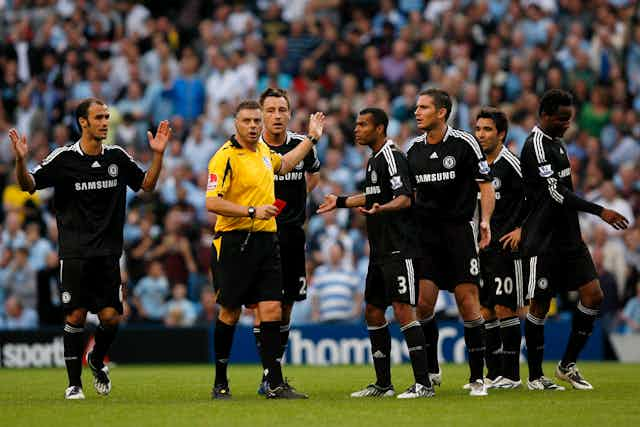Over the weekend, referee Mark Halsey claimed that he had been told to state that he had not seen an incident which occurred in a game he was officiating between Stoke City and Blackburn Rovers in 2011, in order to ensure that the offending player was punished following the fixture. This allegation was later denied by the Professional Game Match Officials Limited (PGMOL), the body that manages elite referees in England.
Unsurprisingly, this has caused widespread debate and questions, principally aimed at the Football Association, the Premier League and the PGMOL. Some within football have even claimed that an investigation into practices involving protocol upon receiving referee match reports and deciding whether retrospective action is required should be undertaken.
But the fact that this debate is being aired at all demonstrates that there are deep issues with the structure in which elite referees in England operate. In short, this debate demonstrates the undue pressure that referees are under to get decisions right.
This comes amid statements from the Premier League prior to the start of the season identifying that player behaviour was intolerable towards referees. It was suggested that there should be a “crackdown” on this type of behaviour towards match officials and a potential increase in the number of red cards as a consequence.
Global football
The issue here is that football is a global sport and the Premier League is the most watched league in the world, a product that generates substantial turnover and profit. This season the Premier League begins the latest television rights deal, lasting until 2019, which is estimated to be worth £8.5 billion for domestic and international broadcast rights.
Such figures create a significant pressure on clubs, managers and players to get results and for referees to be correct in the decisions that they make on the pitch. These decisions can affect the course of a match, or potentially the whole season.
So the leadership that elite referees receive and the structures that they operate within are vitally important. Referees must feel supported. The fact that elite referees train remotely, meeting every two weeks as a group, means that they must also be able to self-regulate their training and motivate themselves, something which effective leaders and support structures must also be aware of. This also requires that the leadership and support of referees must be adequate for their needs, which currently it is not.
In England, elite referees are managed by the PGMOL, an organisation which does not exist in other comparable leagues such as those in Spain, Italy or France. The PGMOL exists in England due to the financial input from the Premier League, the FA and the Football League, with the majority of financial backing received from the Premier League. But the existence of such a body only in England is at odds with the FIFA statutes, which demand that referee organisation should be “directly subordinate” to the member association – in England, the FA. The football association in any given country should be the organisation that solely manages, leads and organises referees at all levels of the game.
A structural issue
So the involvement of the Premier League – the fact that they fund elite referees – is problematic in England. Particularly because the Premier League board is formed of the chairpersons of the current clubs in the Premier League. The members of the board all represent their own clubs’ interests and the Premier League is a product which is sold through television and image rights around the world. Obviously, this presents potential conflict of interests in a number of areas.
So an issue such as Mark Halsey’s becomes much more complicated. A former referee claiming that he had been told to deny he had seen an incident on the pitch adversely affects the stakeholders: the clubs in the league. The potential sanctions imposed on important players of those clubs through retrospective action has the potential to lead to financial losses, through reduced prize money for a lower league place or a shorter run in a cup competition.
Due to the organisation, structures and leadership in other comparable European leagues, such as Spain, Italy and France, there is a reduced chance of this type of incident occurring. Conflict of interests between leagues, clubs and referees are less likely. In short, the systems and protocols in other leagues are often simpler because they do not have a tripartite body such as the PGMOL; the referees are under sole control of the football associations.
At the very least, the support networks and protocols that referees function within on a day to day basis in England should be reconsidered. But comparison with other European leagues suggests that it is the structure of refereeing itself which requires further consideration in the Premier League.

